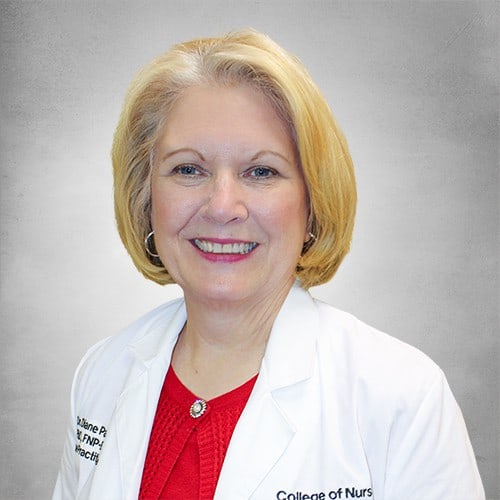Menopause is a natural stage of a woman’s life, and one she can spend many years in: a woman’s average life expectancy is 84, and the average onset of menopause is 51 or 52. Therefore, it is important to seek health care that allows you to maximize quality of life during menopause.
Regional One Health offers a unique Menopause Care Practice featuring Certified Menopause Practitioners who can help women make decisions that improve their health and reduce their risk of serious disease.
Menopause is not a disease. That’s the first thing Certified Menopause Practitioner Diane Todd Pace, PhD, APRN, FNP-BC, NCMP, IF, FAANP, FAAN, wants women to know about this natural stage of their lives, which starts when they have gone 12 months without a menstrual cycle.
This is true for all women unless she had an underlying medical condition requiring the removal of her ovaries or which affected the functioning of her ovaries, such as receiving chemotherapy.
“Every woman who reaches a certain age will go through menopause. It’s a normal reproductive stage,” she said. “It’s a landmark, and it’s a time of change. But it is not a disease.”
That said, menopause is a time when women might need to make changes medically to maximize their health and manage their risk of serious illness. Our Menopause Care Practice can help.
“There are a lot of changes that may affect your quality of life, and you don’t have to go through those without support,” Dr. Pace said. “Women are empowered, and they want to know what’s going on with their health and take action to feel better. That’s what our practice is all about.”
Dr. Pace addressed some common questions to let women know what to expect.
When should I see a Certified Menopause Practitioner?

As a Certified Menopause Practitioner, Dr. Diane Pace has the expertise to help women improve quality of life as they age. “We talk to every patient about her symptoms and how much they impact her life,” she said.
The average age of menopause is between 51 and 52, but most women enter perimenopause and begin experiencing symptoms around age 47. Some women may experience premature menopause before age 40. Dr. Pace stressed that “average” means just that, noting she had a patient many years ago who was still having regular menstrual cycles at age 63.
The main symptom to watch for is a change in menstrual cycles, including missed or light periods or unusually heavy periods and multiple periods in the same month. If the latter is the case, you may need medical intervention to avoid anemia.
Other symptoms include hot flashes, vaginal discomfort, poor sleep, and mood changes.
If you’re experiencing these issues – whether you’re near the typical age of menopause or not – it’s a good idea to visit a provider who specializes in menopausal care.
What can I expect from my provider?
Dr. Pace gets a detailed medical history, does a comprehensive exam as appropriate, and talks to patients about their symptoms and how they impact their quality of life.
This helps her determine if a patient is likely in the reproductive stage of perimenopause or menopause, understand their other health issues, and gauge their risk for disease.
She usually asks patients to keep a journal of their menstrual cycle, so they’ll know when they reach the benchmark of 12 months without a period. Based on research data, she does not recommend blood tests to confirm that a patient has reached menopause. The definition of 12 months without a cycle is the accepted confirmation.
However, if a woman has had a hysterectomy, this sign is not available. In those cases, a blood test may be necessary for confirmation.
Dr. Pace said the interventions remain the same: treat the symptoms that are affecting the quality of life.
What are my treatment options?
Dr. Pace will first discuss non-pharmacological options to manage symptoms, including lifestyle changes to reduce risk of disease associated with menopause. Most of these options have little risk
to the patient. “With a provider’s help, women can make lifestyle changes,” she said. “Sometimes changes like eating healthy, exercising, quitting smoking and limiting alcohol allow patients to manage their symptoms and risk factors without medication.”
From there, shared decision making between you and your provider is important in determining the plan of care that will best fit your goals. Options to be discussed will consider your risk factors and benefits, financial costs, and how they relate to your personal goals and choices.
Because the changes a woman experiences during menopause are related to falling estrogen levels, Dr. Pace can counsel women about hormone therapy that replaces the decreased estrogen and has significant evidence for management of vasomotor symptoms.
Estrogen may also provide protection against serious conditions like heart disease and is indicated to prevent osteoporosis. It can help manage other symptoms like vaginal dryness and may help with mood changes and sleep. Your provider will discuss non-hormonal and hormonal pharmacological options.
There are also products designed to ease discomfort, such as bed fans and “chill” pillows for hot flashes and over-the-counter vaginal moisturizers and lubricants for vaginal dryness. Dr. Pace noted these products aren’t proven in clinical trials, but they do help many patients without risks and are therefore worth trying.

Shared decision-making is a big part of Regional One Health’s Menopause Care Practice. Providers aim to educate women and empower them to make the best decision for their health.
Why should I seek specialized care for menopause?
“Three out of four women who seek care for menopause leave without answers for what to do about their symptoms,” Dr. Pace said. “We’re here to change that. As Certified Menopause Practitioners, we talk to every patient about her symptoms and how much they impact her life.”
Their goal is to help women thrive during what should be seen as a natural, healthy stage of life.
“The average life expectancy for a woman is 84, so many women spend one-third of their life in menopause,” Dr. Pace said. “It can be looked at positively or negatively, and I hope patients will look at it positively. It’s not enough to reach age 84. We want to add life to those years!”
